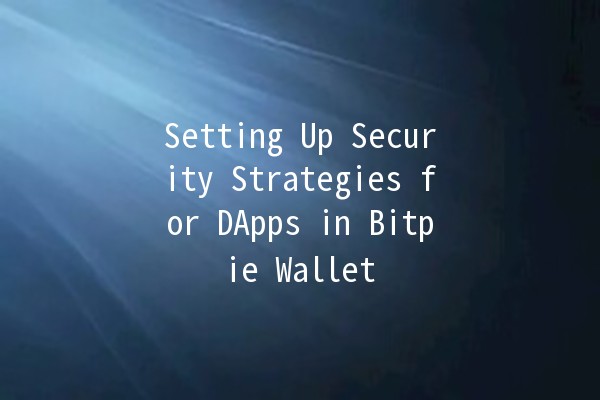
In the evolving world of cryptocurrency, decentralized applications (DApps) play a crucial role in enhancing user engagement and offering various functionalities, from finance to gaming. As a user of the Bitpie Wallet, it's essential to understand how to set up effective security strategies for your DApps to protect your assets and personal information. This article will provide practical advice and tips, helping you navigate the complexities of DApp security while using Bitpie Wallet.
Understanding DApp Security: Why It Matters

DApps operate on decentralized networks, often involving smart contracts and token transactions. While they allow users to interact directly with blockchain technology, the decentralized nature can also introduce security vulnerabilities. Threats can come in various forms, such as phishing attacks, malware, or exploitation of smart contract flaws. Thus, setting up security strategies is paramount for any user engaging with DApps.
Overview
TwoFactor Authentication (2FA) adds an extra layer of security by requiring two forms of verification before granting access. This could be a combination of something you know (your password) and something you have (a mobile device).
Application Example
In Bitpie Wallet, you can enable 2FA by integrating it with authentication apps like Google Authenticator or Authy. This means, even if your password is compromised, attackers would still need access to your second form of authentication.
How to Implement:
Overview
Keeping your software updated is crucial for security. Developers often release patches that fix vulnerabilities.
Application Example
Whenever Bitpie Wallet releases an update, ensure you download and install it immediately. This applies to any applications you use in conjunction with your wallet, including your operating system and antivirus software.
How to Implement:
Overview
A strong password is your first line of defense against unauthorized access. Weak or reused passwords significantly increase the risk of a breach.
Application Example
Create a complex password for your Bitpie Wallet that combines uppercase, lowercase, numbers, and special characters. Avoid using easily guessable information like birthdays or names.
How to Implement:
Overview
Phishing attacks trick users into revealing confidential information by masquerading as legitimate requests. These can come through deceptive emails, messages, or websites.
Application Example
Before clicking on links or providing your wallet information, ensure that the URL is correct. Official communication from Bitpie should come from verified channels.
How to Implement:
Overview
DApps often request permissions to access specific information or carry out actions within your wallet. Limiting these permissions can reduce exposure to risks.
Application Example
When using a DApp, only grant permissions that are essential for its operation. Avoid connecting your wallet to DApps that seem suspicious or require excessive permissions.
How to Implement:
Frequently Asked Questions
If you suspect that your Bitpie Wallet has been compromised, immediately revoke any pending transactions and change your password. Enable 2FA if you haven't already, and consider transferring your assets to a new wallet for security. Always report any suspicious activity to Bitpie's customer support for guidance and support.
Before engaging with a DApp, research its background, developer reputation, and user feedback. Look for transparency in operations, opensource code, and a clear understanding of its functionality. Trustworthy DApps usually have active community engagement and verifiable audits.
Yes, if you have backed up your wallet's recovery phrase or private keys, you can regain access even if you lose your device. Make sure to store this recovery information securely, as it is critical for restoring your wallet.
If you accidentally clicked on a phishing link, disconnect your internet connection immediately. Change your passwords across your accounts, especially related to your wallets, and run a security scan on your device. Be vigilant about closely monitoring your accounts for unusual activity.
Hardware wallets offer a higher degree of security as they store your private keys offline. However, Bitpie Wallet provides robust security features like 2FA and encryption. The safety of using either depends on your usage patterns and how you manage your keys and passwords.
It's advisable to update your passwords every three to six months, especially for critical accounts like your wallet. Also, change your passwords immediately if you suspect a breach or after using a public WiFi network.
While DApps present incredible opportunities within the blockchain ecosystem, they also require a pragmatic approach to security. By implementing comprehensive strategies and practices, users can enhance their protection significantly, ensuring a safer experience while navigating the decentralized world. Stay informed, be cautious, and enjoy the benefits that come with using DApps in your Bitpie Wallet responsibly.

